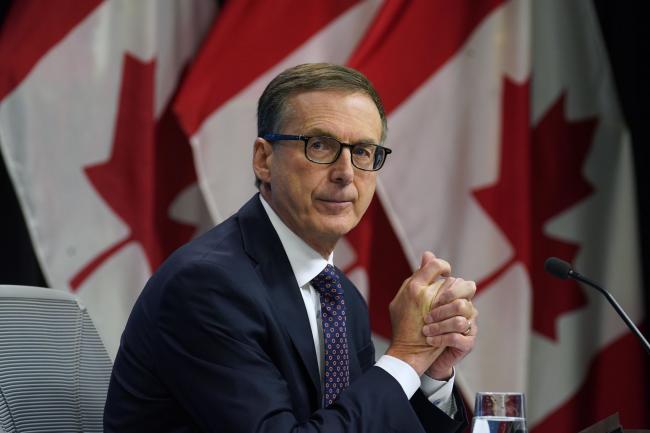
(Bloomberg) — The Bank of Canada kept borrowing costs unchanged in a policy decision Wednesday, but highlighted strength in the labor market and worries about the persistence of inflation that will likely keep expectations of imminent interest rate hikes intact.
In a statement Wednesday, policymakers led by Governor Tiff Macklem left the benchmark overnight rate unchanged at 0.25% and reiterated the economy continues to require considerable monetary policy support. Still, officials dropped a reference to inflationary pressures being temporary, and noted recent job gains have been broad-based with the employment rate returning to pre-pandemic levels.
While the language changes from the previous decision were incremental, there’s nothing in the statement that is likely to derail investor expectations the Bank of Canada is about to embark on an aggressive campaign of rate hikes. Before Wednesday’s decision, investors were pricing in five increases next year, with a more than 50% chance of a first hike by January.
“Inflation is elevated and the impact of global supply constraints is feeding through to a broader range of goods prices,” according to the statement, which added that “recent economic indicators suggest the economy had considerable momentum into the fourth quarter.”
The stand-pat decision was expected by all 22 economists surveyed by Bloomberg News. Markets had been pricing in about a 20% chance of a hike as early as this week.
In the statement, the central bank said it would maintain its extraordinary forward guidance that the benchmark overnight policy rate won’t be increased until the recovery is complete. It reiterated that October projections don’t see that happening until the “middle quarters” of 2022.
Officials also said they are continuing their policy of keeping overall holdings of Canadian government bonds roughly unchanged.
The global economy continues to recover, they said, adding that inflation is increasing in many countries. The omicron variant has “injected renewed uncertainty.”
There were some nuanced changes around the language on inflation however. The central bank said the effects of global supply constraints will “likely take some time to work their way through, given existing supply backlogs.” They said they continue to expect inflation to remain elevated in the first half of 2022, before easing back toward 2% in the second half of the year.
“The bank is closely watching inflation expectations and labor costs to ensure that the forces pushing up prices do not become embedded in ongoing inflation,” the Bank said. A similar sentence in the October statement described these forces as temporary.


